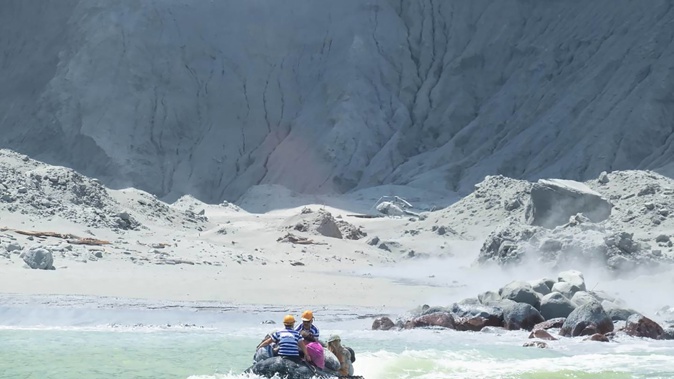

WARNING: This story contains graphic details that may be upsetting to some readers.
As American newlyweds Matthew and Lauren Urey stepped on to Whakaari/White Island in December 2019, they asked a guide how likely the volcano was to erupt.
“He said we shouldn’t be worried. It would turn yellow and go off, but we’d have 10 minutes [to get away],” Lauren Urey recounted in an interview with police.
“He said it would go off every three years,” she added, knowing it had last erupted in 2013 and 2016. “That’s when I started feeling worried.”
The couple, who were on their honeymoon when they visited the volcano off the coast of Whakatāne that fateful day, were the first two witnesses called during the trial into alleged health and safety failings on the island that began in Auckland this week.
Six individuals and organisations are charged with breaching health and safety laws, including the three Buttle brothers, who own and control the island through their business, alongside two tourism companies that on-sold the trips to visitors.
Of the 47 people on the island at the time of the eruption, 22 were killed and 25 were injured.
Matthew Urey took the stand first on Wednesday morning, sitting in the witness box as his hour-long taped interview with police was played to the court.
In the interview, Urey said he and his wife had picked a selection of excursions from their cruise ship, the Ovation of the Seas, that was docking in Tauranga on December 9.
- Whakaari eruption: Defendants to face trial in 2023
- ZB reporter: WorkSafe accusing Whakaari Management Limited of outsourcing health and safety obligations
- 'We cannot be held responsible': Decision made on NEMA charges in Whakaari case
/cloudfront-ap-southeast-2.images.arcpublishing.com/nzme/J3BFHWCYURGGRH3YL2P75HMK2E.jpg)
American tourist Matthew Urey in the witness box at the Whakaari/White Island eruption trial in Auckland. Photo / Jason Oxenham
“[Whakaari] sounded like it would be an amazing one to try,” he said. The pair booked it well in advance and took the bus ride to Whakatāne to journey to the island.
After the “extremely rough” boat ride from Whakatāne, Urey recounted travelling the final distance to the island in a smaller boat, docking at a “very beat down” wharf and climbing up a rusted metal ladder.
They’d been on the island for 10 minutes, stopping to look at two streams, before someone yelled and pointed to the
Lauren Urey said at this point, frantic running ensued. “I just ran for my life, making sure my husband was right by my side.”
She hid behind a rock with a few others, holding Matthew’s hand as they both “screamed in agony”. Small volcanic rocks fell from the air as Lauren tried to make sure her provided hard hat covered her head.
The gas cloud, which by this point had engulfed them, burnt their skin. Lauren said she felt as if she was sizzling.
“I said I love you so much, we’re going to die today,” she recalled telling her husband. Her helmet and respirator were pushed off her face by the force of the blast.
The pair then made the agonising trip back to the water, finding some people submerged in the sea to soothe their burns. They eventually boarded a small boat to rejoin the larger boat that travelled the 90-minute journey to the island.
Urey said attempting to reboard the boat was “chaos”, with the smaller craft attempting to connect with the larger boat three or four times without success.
When finally onboard, another passenger poured water over the pair. In Urey’s interview, he said he’d suffered burns to 53 per cent of his body.
/cloudfront-ap-southeast-2.images.arcpublishing.com/nzme/AH4IYZE56VFKZIWXJOKZOUB3Y4.jpg)
Judge Evangelos Thomas is presiding over the trial. Pool photo / Lawrence Smith
Watching the interviews, the dramatic effects of their injuries were obvious. Both had their hands covered by thick gloves and the remnants of burns were visible on their faces.
Under questioning from WorkSafe prosecutor Kristy McDonald KC, Urey said the burns he suffered were mainly on his lower arms and legs.
He said this was likely due to him wearing shorts and a short-sleeved shirt, believing his injuries would have been more minor had he worn longer clothing.
Lauren Urey said after the eruption she became depressed and sought help for post-traumatic stress disorder, while simultaneously battling the devastating impact of her burns.
The trial continues.
Ethan Griffiths covers crime and justice stories nationwide for Open Justice. He joined NZME in 2020, previously working as a regional reporter in Whanganui and South Taranaki.

Take your Radio, Podcasts and Music with you









